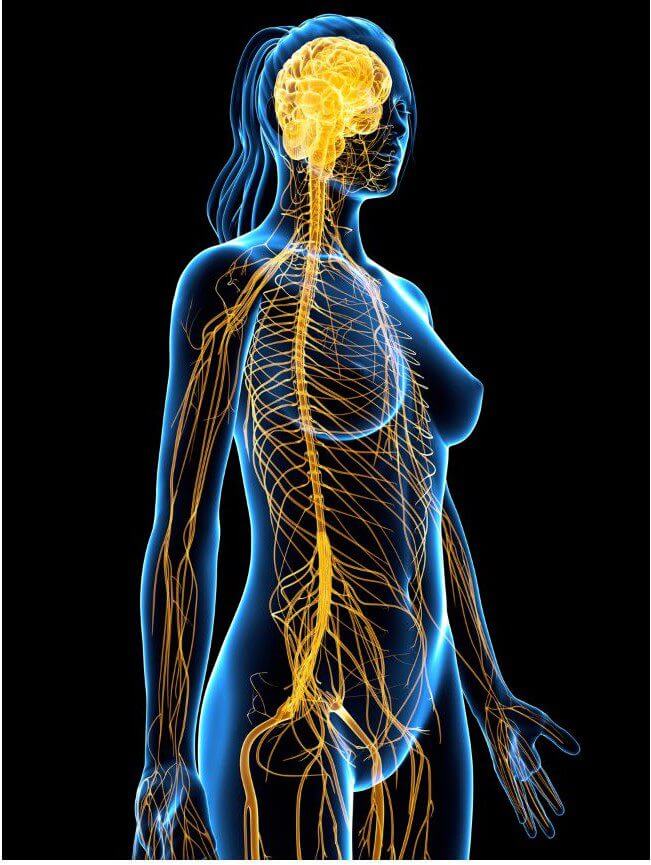Ever wonder why even a quick neck rub can make you instantly relax? It might have something to do with the back of your neck being the origin of the largest nerve in your body—the vagus nerve. It’s a powerful tool for regulating your nervous system, and it plays a role in multiple other systems that regulate your mood, hormone balance, and stress response.
Because it plays such a big role in your nervous system, it can dictate how your body moves and feels, and how it produces and uses various hormones. What’s even more interesting is that you have the power to tone or “activate” your vagus nerve to reduce stress and allow for proper hormone balance.
To gain a bit more control and understanding of how to activate and strengthen your vagus nerve, let’s dive in!
No matter where you are on your holistic health journey, bring it all together with the support of an entire community to empower & encourage you—learn more about the Superwoman Circle.
What is the vagus nerve?
Meet the vagus nerve: the part of the body that seems to explain how our minds control our bodies, and how our bodies influence our minds.
The vagus nerve runs from the base of your brain and down through the neck, where it branches out into the chest and torso. In Latin, the word “vagus” translates to “wandering” which is fitting for the vagus nerve because it spreads throughout the body, almost all major organs on its way. Because of its “wandering” nature, it helps regulate breathing, heart rate, muscles, digestion, circulation, and stress hormones, just to name a few.
Researchers know the vagus nerve has many functions, but they’re still trying to outline exactly how it works. What we do know is that it’s a major regulator of the “rest and digest” part of your nervous system response because of its ability to slow our pulse and lower our blood pressure.
Watch: 7 Hormones Every Woman Should Know
How is the vagus nerve influencing my hormones?
Vagal tone—or how active your vagus nerve is—can be connected to inflammation, hormone balance, metabolism, and emotional regulation (1,2,3).
This could be due to the release of an important neurotransmitter, called acetylcholine, which increases with vagus nerve stimulation. It could also be a result of cortisol, the body’s stress hormone, which is also regulated by vagus nerve activity.
When your vagus nerve isn’t functioning well, you may be unable to regulate stress or the production of cortisol, leading to an imbalance in sex hormones, and other symptoms like hormone-related anxiety.
At the same time, when your vagus nerve is functioning properly, it can help regulate and balance your hormonal response to stress—lowering cortisol levels, and reducing stress and hormone-related anxiety. In clinical settings, activating the vagus nerve has also been shown to reduce epileptic seizures and help with depressive symptoms.
If you have low vagal tone, or a weak vagus nerve response, you may struggle with emotional regulation, inflammation, or depressive feelings (4,5). Meanwhile, healthy vagal activity is associated with the opposite: positive emotions and a balanced mood.
Read: Which Hormones Change Your Mood?
To sum up, there are 5 major reasons to tone your vagus nerve:
1.Decreases stress levels – Stimulating the vagus nerve can lower levels of stress hormones that could be at the root of hormone imbalances.
2.Improves emotional regulation – When your body relaxes, reactivity slowly dissipates, and makes room for energy and mental clarity. This makes it easier to release heavy, undesirable emotions such as resentment, doubt, and fear. Emotional regulation is key to improving both physical and mental health.
3.Reduces inflammation – Vagus nerve stimulation can reduce inflammation in the body.
4.Lowers heart rate – The vagus nerve increases the production of nitric oxide, which has a calming effect on your nervous system, helping to control your body’s stress response and positively impact anxiety disorders.
5.Improves circulation & digestion – The health of your vagus nerve and important organs like your heart, lungs, and digestive tract are intertwined. As vagal tone improves, so does the way these organs function. As a result, you’ll have better circulation and digestive movement as these systems can work more efficiently to deliver nutrients and remove wastes from your body.
How to activate your vagus nerve
Each time you activate your vagus nerve, you send a calming energy that travels all throughout your cells and tissues, helping to heal yourself from within. You can think of your vagus nerve as a delivery system for health and happiness. Sounds almost too good to be true? Test it out and experience the change for yourself!
For starters, try changing your breathing.

The vagus nerve has everything to do with breathing. Deep, slow belly breathing—or diaphragmatic breaths—are one of the most efficient ways to tap into the power of the vagus nerve. You can try box breathing, or my method I like to call the 4-7-8 breath.
Cat-cow stretch
On your hands and knees, inhale deeply while curving your lower back and bringing your head up, tilting your pelvis backwards (like a cow). Then, exhale deeply as you arch your back and tuck your pelvis toward your abdomen (like a cat). It helps to reduce tension and stress while improving flexibility in the spine.
Laugh, hum, or sing
Research shows that humming and singing have a soothing effect, and this may be due to their ability to activate the vagus nerve. Laughter is also associated with an increase in vagal stimulation (6).
Intermittent fasting
Some animal studies suggest that fasting and dietary restriction can activate the vagus nerve, and upregulate your body’s “rest-and-digest” functions, while quieting the “fight-or-flight” feelings (7).
Listen: Should Women Intermittent Fast? Get the Expert Opinion with Dr. Taz & Cynthia Thurlow, NP.
Cold showers
Cold showers are having a moment lately. And despite their unpleasantness, they’re an easy and accessible way to gain several health benefits, including stimulation of the vagus nerve. If you’re just starting out, try adding about 30 seconds at the end of a regular shower where you’re standing under cold water. If that’s too much, you can also begin with splashing your neck and face with cold water, and progress from there. This works because while your body adjusts to the cold temperatures, the parasympathetic nervous system engages, while the sympathetic nervous system slows down (8).
Light exercise
Movement stimulates the vagus nerve. This is possibly the simplest and all around healthiest thing you can do that will benefit hormone balance, anxiety, and your overall mood. Light exercise and yoga stimulate the vagus nerve, as well as higher intensity training too. What matters most is the type of movement you choose makes you happy and energized when you’re finished.
Probiotics
The vagus nerve connects the brain to the gut, and vice versa. And we also know that the makeup of your microbiome can actually directly activate vagus nerve function. To build a robust and healthy gut microbiome, eat a balanced diet, get enough fiber, and consider investing in an effective probiotic (9).
Get started with daily Belly Fix for a happy, healthy gut.
Should you tone your vagus nerve for healthy hormones?
When we are feeling stress, our bodies go into overdrive. This can cause a number of problems, including hormonal imbalance. One way to help reduce stress and rebalance your hormones is to activate the vagus nerve. The vagus nerve is responsible for regulating many bodily functions, including stress response. By learning how to activate the vagus nerve, you can find relief from stress and stop stress hormones from interfering with overall hormonal balance!
Resources
- https://www.pnas.org/doi/abs/10.1073/pnas.1605635113
- https://www.ncbi.nlm.nih.gov/pmc/articles/PMC4082307/
- https://pubmed.ncbi.nlm.nih.gov/28460255/
- https://www.ncbi.nlm.nih.gov/pmc/articles/PMC4076387/
- https://onlinelibrary.wiley.com/doi/abs/10.1111/nmo.12817
- https://www.psychologytoday.com/us/blog/try-see-it-my-way/202003/sing-in-the-shower-make-friends-your-vagus-nerve
- https://www.ncbi.nlm.nih.gov/pmc/articles/PMC6471315/
- https://www.ncbi.nlm.nih.gov/pmc/articles/PMC9518606/
- https://pubmed.ncbi.nlm.nih.gov/24997031/



